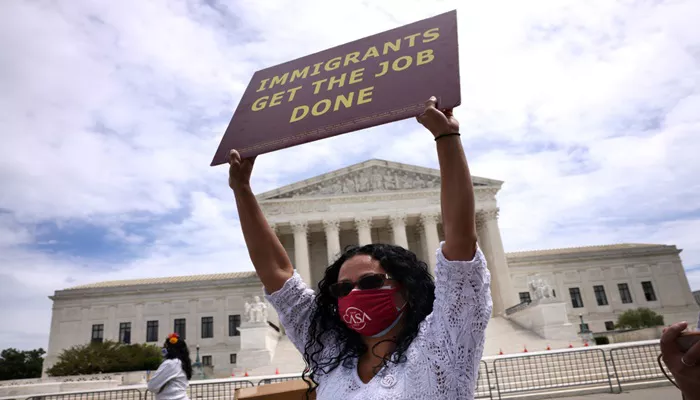Immigrant Rights Groups Criticize Proposed Alabama Immigration Bills.
Immigrant rights groups are voicing strong opposition to two immigration bills set for discussion during the 2025 regular session of the Alabama Legislature.
Key Proposals in the Bills
The first bill, HB 7, introduced by Rep. Ernie Yarbrough (R-Trinity), seeks to empower local law enforcement agencies across Alabama, including sheriffs and police departments, to enter into agreements with federal agencies like the U.S. Department of Justice and the U.S. Department of Homeland Security. These agreements, known as Memorandums of Understanding (MOUs), would allow state agencies to enforce federal immigration laws.
The second bill, HB 3, sponsored by Rep. Chip Brown (R-Hollinger’s Island), proposes harsher penalties for undocumented immigrants convicted of crimes.
Requests for comment from Yarbrough and Brown went unanswered. Yarbrough had previously introduced a similar bill last year and criticized the federal government’s handling of immigration enforcement during an Alabama House Public Safety and Homeland Security Committee meeting in April.
“Our nation’s security and the lives of our people are at great risk because the federal government has largely abandoned its sworn duty to uphold and defend with regards to the southern border,” Yarbrough said at the April meeting.
Disparities in Crime and Immigration Rates
Despite these assertions, studies consistently show that undocumented immigrants are significantly less likely to commit crimes compared to U.S.-born citizens. Additionally, Alabama has a much lower rate of immigration than the national average. According to the U.S. Census Bureau, only 3.8% of Alabama’s population is foreign-born, compared to 14% nationwide.
Yarbrough’s bill would authorize state law enforcement officers to arrest individuals suspected of being in the country illegally if there is probable cause. Jail staff would be tasked with determining the immigration status of detainees, and if documentation cannot be provided, the Department of Homeland Security’s Law Enforcement Support Center would be notified.
Community Safety Concerns
Allison Hamilton, executive director of the Alabama Coalition for Immigrant Justice, expressed deep concerns about the potential consequences of Yarbrough’s bill.
“The worst part about the bill is that it gives permission, and actually encourages law enforcement to arrest people they suspect of being undocumented,” Hamilton said. “That is not good for law enforcement, and it is really harmful for trust in communities that have crime issues.”
The bills are emerging at a time when former President Donald Trump, the leading Republican candidate for the presidency, has called for mass deportations of undocumented immigrants. Alabama’s legislative history includes HB 56, a 2011 law that sought to criminalize nearly every aspect of an undocumented immigrant’s life. Most provisions of HB 56 were later struck down by federal courts.
“It is impossible to determine someone’s immigration status just by looking at them,” Hamilton noted. “But this is encouraging law enforcement to arrest people that they suspect of being an undocumented immigrant. There is really no information to inform them about how to look for an undocumented immigrant other than racially profiling them.”
Federal vs. Local Enforcement
While the enforcement of immigration laws primarily falls under federal jurisdiction, there are instances when the federal government collaborates with state and local law enforcement. The Department of Homeland Security’s 287(g) program, for example, allows state and local agencies to enforce federal immigration laws under MOUs.
However, these programs have been controversial. J. Kevin Appleby, a senior fellow at the Center for Migration Studies, a New York-based nonpartisan think tank, pointed out that such initiatives have drawn criticism and legal challenges. “Their effectiveness was in question because it made them immigration agents and divided their attention away from crime in their neighborhoods,” Appleby said.
The American Immigration Council’s 2021 report highlighted issues such as widespread racial profiling and the arrest of immigrants for minor offenses under the 287(g) program. Cost is another significant concern. In 2017, Harris County, Texas, terminated its 287(g) agreement, reallocating the $675,000 previously spent on the program to improve crime clearance rates and other priorities.
Increased Penalties for Undocumented Immigrants
Brown’s bill, HB 3, seeks to increase penalties for undocumented immigrants convicted of crimes involving children. Under this bill, undocumented immigrants convicted of a Class D felony, which typically carries a sentence of one to five years, would face Class C felony charges, with sentences ranging from one to ten years in prison.
Similarly, Class C felonies would be elevated to Class B felonies, punishable by two to twenty years in prison, while Class B felonies would become Class A felonies, carrying sentences of ten years to life. Those convicted of Class A felonies would serve a minimum of fifteen years in prison.
The bill also stipulates that undocumented immigrants convicted of misdemeanors involving minors would be sentenced as Class C felons.
Criticism of the Penalty Enhancements
Tom Jawetz, a senior fellow for immigration policy at the Center for American Progress, a left-leaning think tank, criticized the proposed enhancements. “All available evidence establishes that immigrants commit crimes at a lower rate than native-born Americans, and undocumented immigrants commit crimes at a lower rate than those with lawful status,” Jawetz said. “There’s no reason to believe immigrants, regardless of status, are any more likely than anyone else to commit crimes against minors.”
A study published by Northwestern University in March 2024, which analyzed 150 years of U.S. Census data, supports these findings, revealing that immigrants are less likely to be incarcerated than individuals born in the United States.
Hamilton also emphasized the significant contributions immigrants make to the country. “Immigrants are paying taxes, they are paying toward Medicare and Social Security that they will never collect on,” she said. “I think it is really important for people in Alabama to understand that immigrants in Alabama are propping up our own safety nets. And they are doing jobs that need to be done that no one else wants to do.”


